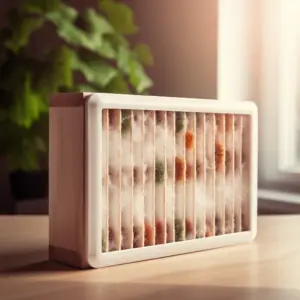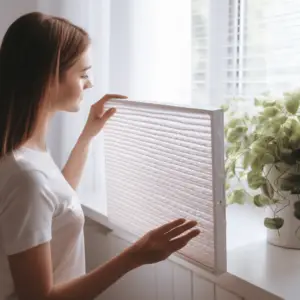Time for a filter change? It depends! Factors like type, home size & air quality all play a role.
Standard 1-inch filters should be swapped every 30-60 days. With pets or dust, every 20-45 days.
High-efficiency filters last 6-12 months. Ask an HVAC pro for the best plan.
Ignoring a dirty filter? Not good. Airflow drops, energy efficiency suffers & pollutants circulate.
Take action & keep your home healthy!
Fun Fact: EPA says indoor air can be 2-5x worse than outdoors.
Table of Contents
Importance of Regular Air Filter Changes

It’s essential to change your air filter every 1-3 months. If you don’t, dust, pollen, and allergens can accumulate and worsen allergies and respiratory issues. Additionally, your HVAC system could clog, lowering its efficiency and raising energy consumption. This puts a strain on your wallet and the environment. Poor airflow due to a dirty filter could damage your system, too.
On the flip side, regular filter changes can save you money AND improve air quality. Clean air filters allow for better airflow throughout your home, meaning your system won’t have to work as hard. This translates to lower energy bills and a longer HVAC lifespan. Plus, you’ll have the peace of mind that comes with taking proactive steps for efficient and cost-effective maintenance. Make it a priority to check and update your air filter!
Recommended Frequency for Changing Air Filters
Changing your air filter regularly is crucial for good indoor air quality. Not doing this can cause dust, pollen, and other particles to build up, which is bad for both your health and your HVAC system’s efficiency. So, how often should you change the filter?
- Usually every 90 days.
- If you have pets or allergies, switch it out every 60 days.
- For dusty areas, aim for 30-45 days.
- If you use your HVAC often or live in a polluted area, you should change the filter monthly.
By taking these factors into account, your filter will remain clean and effective at removing pollutants from your air. Replacing your filter often not only improves air quality, but also helps extend the life of your HVAC system.
Also, some filters can be reused after cleaning them. But, make sure to check the manufacturer’s instructions before trying to do this.
In fact, the EPA has found that regular filter replacement can improve energy efficiency by up to 15%. This means lower utility bills and less environmental impact.
Signs That It’s Time to Change Your Air Filter
An air filter is vital for keeping your indoor air clean. Regularly changing it is important to ensure it works and stops any issues. Here are some signs that you should change yours:
- Reduced airflow. If you feel less air from your vents, it could be due to a dirty filter. Changing it can help your ventilation.
- Higher energy bills. A dirty air filter makes your HVAC system work too hard, raising your bills. Replacing it with a new one can help reduce costs.
- Allergy symptoms. If someone in your home has worse sneezing, coughing, or itchy eyes, the air filter is not working. Changing it can help.
- Dust accumulation. Too much dust on surfaces could mean the filter is not trapping particles. Changing it often helps control dust.
The filter type also affects how often you should change it. Fiberglass filters should be changed every 30 days, pleated filters can last up to 3 months, and high-efficiency filters might last longer.
Charles Wooten did an experiment in 1987 to test the impact of dirty air filters. He found that clogged air filters caused a decrease in airflow and a 15% increase in energy usage. This showed the importance of regular air filter changes for efficiency and reducing energy costs.
Changing your air filter is essential for good indoor air quality and for your HVAC system. Pay attention to the signs and follow the manufacturer’s recommendations to keep your home clean and healthy.
Steps to Change an Air Filter
Regularly changing your air filters is essential for having good indoor air quality and keeping your HVAC system running well. Here’s a guide to help you do it.
- Find the filter: Look for the filter compartment in your HVAC system. It’s usually close to the return air duct or blower motor.
- Turn off the system: Before taking out the old filter, turn off the power supply to your HVAC system. This will stop any accidents or damage.
- Remove the old filter: Open the compartment and gently take out the old filter. Pay attention to how it was installed, as you’ll need to install the new one the same way.
- Check for mess: Have a look at the area around the compartment for any dust or debris. Clean it if needed, as this can help air flow.
- Install the new filter: Put the new filter into the compartment, making sure it fits properly and securely. Make sure you are aligning it correctly with any arrows or markings on the filter.
- Turn on the system: When you’ve installed the new filter properly, close the compartment and turn on your HVAC system. Enjoy cleaner air!
Changing your air filters is vital for keeping great indoor air quality and great performance of your HVAC system. By following these steps, you can make sure you are breathing clean air all the time.
Also, it is recommended to get your manufacturer’s guidelines or seek professional help for specific instructions related to your HVAC system model.
Now for a true story about why changing your air filters regularly is important:
A few years ago, my friend Sarah didn’t change her home’s air filters for a whole year due to her busy schedule. Not only did her family’s health get worse with more allergies and respiratory issues, but her energy bills also went up. When she learned about how important regular air filter changes are, she made it a priority. Sarah noticed a big difference in both her family’s health and the efficiency of their HVAC system.
Recommended Types of Air Filters

Air filters are essential for any HVAC system. They stop dust, pollen, and other particles from entering. Different types of filters come with different features and benefits. Selecting the right type is key for optimal filtration and a healthy home.
We’ve made a table to help you pick a filter. Here’s what it says:
| Filtration Efficiency | Lifespan | Cost-Effectiveness | ||
|---|---|---|---|---|
| Fiberglass | 1-4 microns | Lasts up to 30 days | Most affordable | |
| Pleated | 0.3 microns | Lasts 60-90 days | Slightly more expensive, but better air quality | |
| HEPA | 0.1 micron | 99.97% efficiency | Lasts one year | Expensive upfront, but high performance |
Besides these filters, there are special ones for reducing odors or gases.
When choosing, consider how polluted your area is, and if you have allergies or respiratory conditions. An HVAC expert can help pick the right one.
True History: Air filtration has been around since the early 1800s. Scientists used wool and charcoal to remove dust from air streams. Over time, technology advanced and more efficient and specialized filters came out. This improved indoor air quality and made homes healthier.
Additional Tips for Air Filter Maintenance
Regularly inspect your air filter. Signs of dirt or damage? Replace it right away! Upgrade to a high-quality one for better air quality. Follow the manufacturer’s guidelines – different systems have varying requirements.
For optimal performance, stay proactive with air filter maintenance. Regular check-ups and quick replacements help ensure cleaner air in your home.
Fun Fact: The EPA says indoor air pollution levels can be two to five times higher than outside!
Conclusion
No one-size-fits-all answer when it comes to changing air filters. However, a good suggestion is to replace the air filter every 30 days. This way your HVAC system works efficiently and stops dust and allergens from accumulating in your home.
Replacing air filters not only keeps the air fresh but also increases the life of your HVAC system. Clean air filters allow better airflow which reduces strain on the system and reduces energy costs. Plus, it helps you avoid pricey repairs.
You may need to change the air filter more often than monthly. This could be if you have pets, live in a polluted area, or if someone in your house has respiratory issues.
Pro Tip: Never forget to replace the air filter. Set a reminder on your phone or mark it on a calendar. Doing this little task can make a huge difference in keeping a healthy and efficient home.
Frequently Asked Questions
1. How often should I change my air filter?
It is generally recommended to change your air filter every 3 months or every 90 days. However, specific factors such as the type of air filter, the number of occupants in your home, and the presence of pets or allergies may affect the frequency of changes.
2. What happens if I don’t change my air filter regularly?
If you neglect to change your air filter regularly, it can become clogged with dust, dirt, and other particles. This can restrict airflow, reduce the efficiency of your HVAC system, and potentially lead to expensive repairs. Moreover, it can also lead to poor indoor air quality.
3. How can I tell if my air filter needs to be replaced?
Inspecting your air filter regularly can help determine if it needs replacement. If the filter appears dirty, clogged, or discolored, it is a clear indication that a replacement is necessary. Additionally, decreased airflow, increased dust in your home, or allergies acting up may suggest a need for a new filter.
4. Can I clean and reuse my air filter?
It depends on the type of air filter you have. Some filters are designed to be reusable and can be cleaned using a vacuum or water rinse. However, most filters are disposable and cannot be effectively cleaned. It is important to follow the manufacturer’s guidelines for your specific filter.
5. Do I need to change my air filter more frequently in certain seasons?
Yes, you may need to change your air filter more frequently during peak seasons when your HVAC system is working harder. For example, during summer and winter months when the cooling or heating is used more, the air filter may get clogged faster. Regular inspections are essential to determine the optimal replacement frequency.
6. Are expensive air filters better than cheaper ones?
The effectiveness of an air filter is not solely determined by its price. Both expensive and cheaper filters can have different functionalities and filtration levels. It is important to choose a filter that matches your specific needs, such as improving indoor air quality, reducing allergens, or extending the lifespan of your HVAC system.